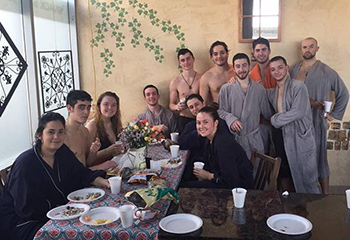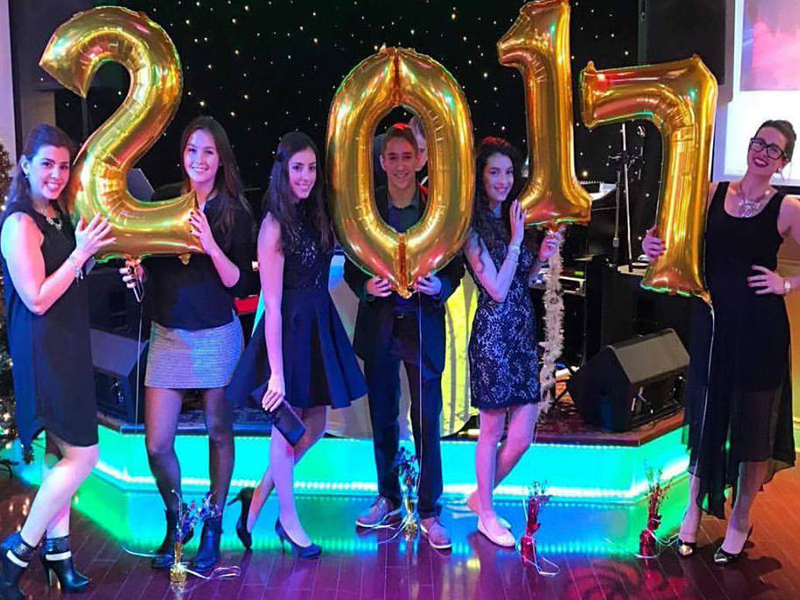It is no secret that we all eventually turn into our parents. For some, this could mean having the same mannerisms and behaviours as them, but for others, it means celebrating every birthday in a Russian restaurant and dancing to Alla Pugacheva with 30 of their closest friends.
Not many people have heard of the term “reverse assimilation,” but it is certainly something a lot of people can relate to, especially those who are the children of immigrants.
It seems there is a growing trend of people embracing their heritage. Many young people fear being seen as “basic” and try to stand out in any way they can. This is perhaps one of the reasons for this sort of reverse assimilation.

There are many organizations in Canada, and around the world, that cater to the community of Russian Jews. From Limmud FSU, the weekend-long conference that was started by Chaim Chesler, to Jewski, an organization that focuses on engaging young Russian Jews in university, there is an increasing demand for such programs. There are Russian-Jewish camps, like J-Academy, and even a Birthright trip that is specifically for Russians.
Merilin Kernitzman is the social media and student engagement co-ordinator at Jewski. She has been involved in the Russian-Jewish community since she was a child and remembers a time when there were hardly any organizations that catered to Russian Jews.
When Jewski was started seven years ago by Anna Kissin, it was seen as a way of engaging Russian-Jewish university students, as they were one demographic that did not usually attend regular Hillel events. Jewski started by holding small events at York University in Toronto, sometimes with just a few people in attendance. Since then, Kernitzman says the organization has grown “tremendously” and is now spreading to universities across the Greater Toronto Area and even has a chapter at the University of Western Ontario in London.
It is essentially a club where young Russian Jews can start the process of reverse assimilation, or as they call it, “become engaged in the Jewish community.”
Daniel Goldshtein, 20, is interning with Jewski at York University. Much of his job involves planning events during the school year, as well as meeting with Russian Jews, in order to encourage them to come to the events.
Goldshtein is a prime example of how much being in a Jewish-Russian club can have an impact on a person. Before becoming involved with Jewski two years ago, he says the majority of his friends were not Russian Jews and he did not feel much of a connection to that part of his life. Fast forward a year: now, most of his friends are Russian Jews and he has become much more involved in the community.
Like many other Russian Jews, Goldshtein and Kernitzman attended public high schools that did not have programs specifically for Jewish students and they wanted to become more involved with Toronto’s vibrant Jewish community.
“Before Jewski, I didn’t have a well-defined community of Russian-speaking Jews, but now that I do, we all let our ‘FOBiness’ out together. I like the sense of community and the people that are involved in it. We have a lot of shared inside jokes about our Russian culture, and it’s so much easier to make a connection and become friends with someone with the same background as me,” said Kernitzman, who just finished her fourth year at York University and has been involved with Jewski for her entire university career.
With approximately 50,000 Russian Jews in the Greater Toronto Area, it comes as no surprise that there are so many new initiatives designed to engage such a large population.
“If you don’t cater (to) them and engage them, you lose them. And I think that’s why there are so many organizations that aim to connect with Russian Jews, because they are just not interested in going to regular Jewish events and organizations,” said Goldshtein.
Because so many Russian Jews tend to stick together, they have created a community within the Jewish community — a group of people who, although they have Jewish roots, are not necessarily always interested in Jewish topics.
“There are a lot of people who grow up here in Canada, but become more Russian as they get older, and I think that’s largely due to the fact that a lot of Russian Jews don’t have much of a connection to Judaism, because their parents aren’t religious, so they go back to their inner core, which is their Russian identity,” said Goldshtein.
Mikhail Krivyh, a first-year student at the University of Toronto, is just one of the many students who attends Jewski events and, despite having lived in Russia for 10 years, does not find himself becoming more Russian as he gets older. Though he, like Kernitzman, is involved in the J-Academy camp, he has attended Jewish day school for most of his academic career and is therefore more connected to his Jewish heritage, describing it as something that has always been a “constant” in his life.
“When it comes to culture and people, when I was younger, I wanted to completely forget about that and join the melting pot, so to speak. Now, though I still want to be part of Canadian society, I also feel pride and I cherish this unique identity that I have because it’s still a part of me,” said Krivyh.
Krivyh says Russian Jews are different from other sorts of Jews because of their unique history, which has been plagued with many tragedies and hardships. From the Pale of Settlement and pogroms, to the communist regime, Russian history has not been kind to its Jewish inhabitants.
“For centuries in Russia, being Jewish was not viewed as an advantage. That’s how I understand the communal perception. Canadian Jewry does not really understand that mentality, but many organizations try to change that. It certainly worked for me, by going to Jewish school, and now I am a proud Jew,” said Krivyh.
However, for some, becoming more Russian is all about the jokes.
“I find that some aspects of Russian pop culture are just really fun and lighthearted. My friends and I always listen to music by singers like Alla Pugacheva and Philip Kirkorov, and it is so much more fun than English music,” said Miriam Amdur, a second-year student at Schulich school of business at York University.
“I find that I have become a lot more Russian as I’ve gotten older, and my closest friends are of the same background as me. It really just feels the most natural for us, because we are doing what we have seen our parents do for our entire lives, and I find it really liberating,” said Amdur.
Though there is no way to know how or why this reverse assimilation phenomenon came to be, one thing is certain: Russian 1980s pop music is making a comeback and it’s being blasted in the cars of young Russian Jews all across Toronto.





